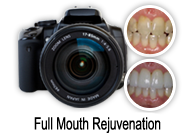Denture Information You Should Know
Created on August 15, 2016

Or Contact Us Today For a Consultation!
Shrinking Gums & Dentures
When your natural teeth are lost, what remains are the bony ridges where your teeth used to be. Your dentures will rest on these ridges. It is normal for the ridges to shrink – this is known as atrophy or wasting of the bone. This process is inevitable and varies with each patient. It is one of the main reasons some people have difficulty wearing dentures.
Palate Shapes Effect Denture Fitment
The shape of each patient’s palate (the “roof” of the mouth) influences the fit and suction needed to wear an upper denture. A square or rounded palate shape is more suitable than a small flat, or V-shaped palate.
How Lower Dentures Should Fit in Your Mouth
Most complaints about wearing dentures have to do with lower dentures. Why? Because lower dentures are in a mobile environment – where the lips, cheeks, and tongue try to dislodge the denture during eating or speaking. The lower ridge is also much smaller than the upper, and is prone to even more shrinkage; there is no large surface on which to create suction. These factors often cause a lower denture to move or trap food. In time, a successful denture wearer will learn to control their facial muscles – an essential skill when wearing new dentures.
How Long Should Dentures Last?
Your dentist should examine your dentures every year to check for proper fit and to make any necessary adjustments due to wear. Dentures are worn down by eating and cleaning, but the denture base will not adjust to the ridges in your gums which are changing constantly. You should have your mouth checked every year to ensure against permanent damage and to check for any unwanted conditions. Dentures can be replaced or relined if they become loose.
What About Fixatives?
Fixatives are not just for loose-fitting dentures. They can give you extra confidence by providing a more comfortable fit and preventing you from worrying about your dentures slipping. Fixatives also help prevent bits of food from getting under your dentures.
Schedule a Consultation
Do you currently have dentures? Are you considering them? Call (413) 781-7645 to schedule a consultation appointment, or fill out our contact us form.
Tagged with:




